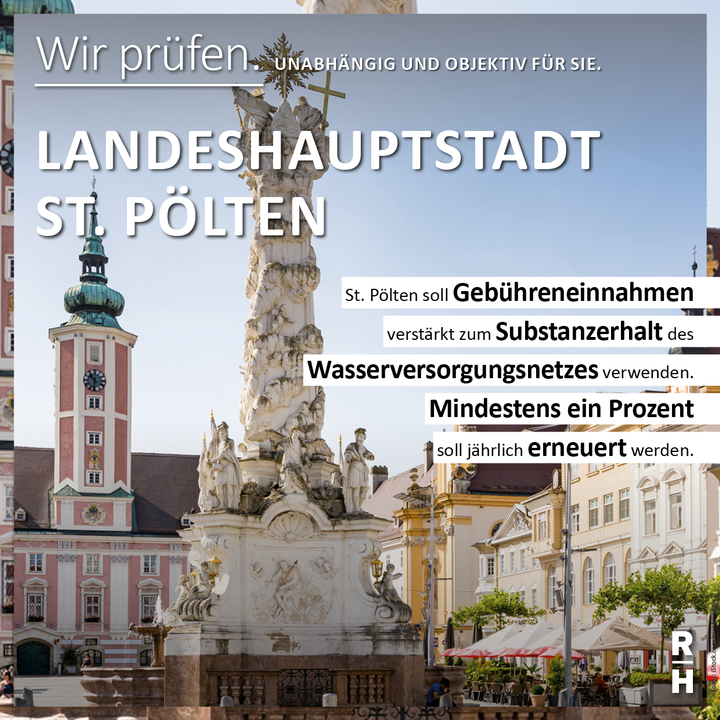St. Pölten should use revenue from fees more intensively for the renovation of water pipes

The provincial capital of St. Pölten allocated surplus funds from the water usage fee to equity interests without being able to present an intrinsic connection of such equity interests to water supply. This is revealed by the Austrian Court of Audit (ACA) in its report published today. The auditors furthermore criticize the risky derivative transactions of the city of St. Pölten, conflicts of interest and the lack of transparency as regards the premiums paid to equity interests. The audited period essentially spanned the years from 2015 through 2018. The audit was thus carried out before the outbreak of the COVID-19 pandemic.
Surplus funds for equity interests
St. Pölten has a water supply facility. With a water usage fee of EUR 1.30 per cubic metre for 2015 and 2016, a surplus of EUR 1.36 million was generated for each year in the budget relating to public charges. From 2015 to 2018, EUR 7.08 million were thus generated in surplus funds, of which EUR 5.44 million were allocated to the equity interests of the city. Without taking these “withdrawals from revenue” into account – as termed by the city – the water usage fee would have amounted to only EUR 1.18 per cubic metre.
At the same time, the auditors found that the renovation rate for both the water supply and the sewer network was too low. In order to preserve the substance, an annual renovation rate of at least one per cent should be pursued. The ACA furthermore recommends to ensure that the surplus in fees is used for a designated purpose. Withdrawals not directly connected to water usage should be returned to the budget within ten years. The ACA pointed to the risk of unlawful fee notifications and repayment claims derivable therefrom.
The managing director appointed himself as managing director
St. Pölten held direct interests in twelve companies organized under private law, and indirect holdings in three others. From its equity interests, the city had to deal with an average annual disposal of EUR 9.20 million. The liabilities of the majority equity interests amounted to EUR 84.98 million in end-2018.
Bonuses for managing directors of majority equity interests lacked transparency and were low in performance orientation. At the St. Pölten University of Applied Sciences, for example, bonuses were granted even though the employment contracts did not provide for them. The auditors furthermore criticized the automatic valorization of the managing directors’ salaries, which, at times, were considerable.
At the Hochschule St. Pölten Holding GmbH, its subsidiary Fachhochschule St. Pölten GmbH and its second-tier subsidiary Fachhochschule St. Pölten ForschungsGmbH, the same persons were appointed to the management respectively. This resulted in potential conflicts of interest and self-dealing. For example, one managing director appointed himself as managing director of the second-tier subsidiary, the managing directors granted their own discharge, approved the budget they had prepared themselves and acted as both lessor and tenant in one contract. The ACA also criticizes the equity interest management of the city of St. Pölten. For example, equity interest reports containing information relevant to management and key business figures were lacking.
Financial situation
The overall budget of the city of St. Pölten was balanced in the period of 2015 to 2018. This was achieved because it contracted debts. Since 2015, the debts of the city have increased by 38 per cent. In 2018, the financial debt was at EUR 115.58 million, whereas the largest deficit was generated in 2016. Among other things, a derivative transaction that went badly amounted to EUR 29.90 million.
The ACA recommends to the city – under consideration of the specific requirements of addressing the COVID-19 pandemic – to pursue a sustainable and financially viable budgeting.
Risks related to derivative transactions
The municipal council authorized the mayor to enter into derivative transactions on behalf of the city of St. Pölten without any restrictions and without prior consultation of the municipal council. The municipal supervision found that a municipal council resolution would have been required for certain derivative transactions. Those responsible exceeded their powers when concluding 14 derivative transactions that exceeded the risk limit. From 2005 to 2012, St. Pölten concluded a total of 31 derivative transactions for a nominal amount of EUR 300 million with several banks.
Among other things, the city acted riskily when concluding an interest rate swap with unlimited currency risk. As a result, it suffered a financial disadvantage of EUR 41.66 million. In another derivative transaction with a British bank, St. Pölten incurred losses of EUR 5.25 million. According to the City of St. Pölten, investments in risky papers have been prohibited after corresponding legal amendments.
- pdf Datei:
- 4,033.0 KB
- Umfang:
- 120 Seiten
Report: Provincial Capital of St. Pölten (in German)
From March to May 2019, the ACA audited the provincial capital of St. Pölten. The audit aimed at assessing the financial situation, the equity interest management, the derivative transactions, the human resources management and the budget relating to public charges.


